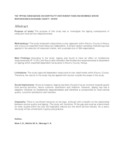Please use this identifier to cite or link to this item:
http://ir-library.mmust.ac.ke:8080/xmlui/handle/123456789/1535Full metadata record
| DC Field | Value | Language |
|---|---|---|
| dc.contributor.author | Were, S, O. | - |
| dc.contributor.author | Miricho, M, N. | - |
| dc.contributor.author | Maranga ., V, N | - |
| dc.date.accessioned | 2021-05-31T08:17:24Z | - |
| dc.date.available | 2021-05-31T08:17:24Z | - |
| dc.date.issued | 2020-03 | - |
| dc.identifier.uri | https://doi.org/10.18510/ijthr.2020.712 | - |
| dc.identifier.uri | https://giapjournals.com/ijthr/article/view/ijthr.2020.712 | - |
| dc.identifier.uri | http://r-library.mmust.ac.ke/123456789/1535 | - |
| dc.description.abstract | Purpose of study: The purpose of this study was to investigate the tipping consequence of restaurant food service responsiveness. Methodology: The study employed a descriptive survey approach within Kisumu County in Kenya, with a focus on classified hotel restaurant (dependent). A simple random sampling methodology was applied in the selection of restaurant clients, with a sample size of 384 respondents. Main Findings: According to the study, tipping was found to have an effect on foodservice responsiveness (P ˂ 0.05), and thus a clear indication that foodservice responsiveness is dependent on tipping within classified dependent restaurants in Kisumu County, Kenya. Limitations: The study captured dependent restaurants in star-rated hotels within Kisumu County. Therefore, the results of the study may be applied with caution outside the scope of the study. Social Implications: Since its inception, tipping has been thought of as an incentive towards quality food service provision, hence customer satisfaction and retention. However, tipping has had a negative influence on foodservice responsiveness and therefore a compromise on food service quality, customer satisfaction and retention. Originality: There is insufficient literature on the topic, although with a handful on the relationship between service quality and tipping. This study will, therefore, fill the gap and used as a benchmark for other studies within not only the hospitality industry but the entire service industry. As a result, the study will be utilized both in policy and practice. | en_US |
| dc.language.iso | en | en_US |
| dc.publisher | Tourism & Hospitality Reviews | en_US |
| dc.subject | TIPPING, CONSEQUENCE, HOSPITALITY, RESTAURANT, FOOD AND BEVERAGE, SERVICE RESPONSIVENESS | en_US |
| dc.title | THE TIPPING CONSEQUENCE ON HOSPITALITY’S RESTAURANT FOOD AND BEVERAGE SERVICE RESPONSIVENESS IN KISUMU COUNTY – KENYA | en_US |
| dc.type | Article | en_US |
| Appears in Collections: | Gold Collection | |
Files in This Item:
| File | Description | Size | Format | |
|---|---|---|---|---|
| THE TIPPING CONSEQUENCE ON HOSPITALITY.pdf | 296.84 kB | Adobe PDF |  View/Open |
Items in DSpace are protected by copyright, with all rights reserved, unless otherwise indicated.
